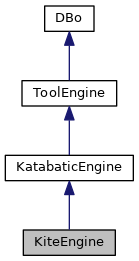The Kite Tool.
More...
The Kite Tool.
Lookup Mechanism
Please look at Kite::Session for an explanation of the lookup mechanism from Hurricane::Segment or Katabatic::AutoSegment to TrackSegment.
◆ staticGetName()
| const Name & staticGetName |
( |
| ) |
|
|
static |
Returns: The unique string identifier for the KiteEngine class of ToolEngine.
◆ create()
◆ get()
Returns: The KiteEngine associated to cell. NULL if there isn't.
◆ base()
Returns: The KiteEngine, casted as it's base class (KatabaticEngine).
◆ getKiteConfiguration()
| Configuration * getKiteConfiguration |
( |
| ) |
|
|
inline |
Returns: The KiteEngine configuration. The Kite Configuration is a derived class of KatabaticConfiguration.
◆ getConfiguration()
| Configuration * getConfiguration |
( |
| ) |
|
|
virtual |
◆ getBlockageNet()
Returns: The Net which is used to mark the blockage segments. It's not part of the Configuration per se but an isolated attribute.
◆ getToolSuccess()
| bool getToolSuccess |
( |
| ) |
const |
|
inline |
Returns: true if the tool was successful, that is, all the Net were routeds.
◆ getEventsLimit()
| unsigned long getEventsLimit |
( |
| ) |
const |
|
inline |
Returns: The maximal number of allowed routing events. This limit is a security against infinite looping, be sure that it is great enough not to prevent normal routing completion.
◆ getRipupLimit()
| unsigned long getRipupLimit |
( |
unsigned int |
type | ) |
const |
|
inline |
◆ getRipupCost()
| unsigned long getRipupCost |
( |
| ) |
const |
|
inline |
Returns: the differential used while comparing two ripup costs.
The documentation for this class was generated from the following files:
